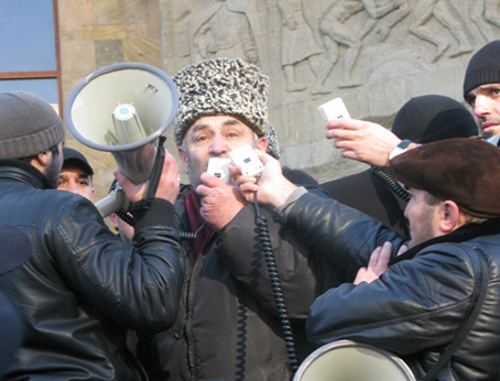
Has the Arab Spring Arrived In Dagestan?
Publication: Eurasia Daily Monitor Volume: 8 Issue: 215
By:

On November 25, Dagestan’s capital, Makhachkala, saw its largest protest in recent times. An estimated 2,500-3,000 people took to the streets to object to growing police abuse. Dagestani First Deputy Prime Minister Rizvan Kurbanov tried to reassure the protesters that the authorities were vigilantly protecting human rights, but did not convince them. Several Dagestani civil organizations made up of relatives of people kidnapped by the security services organized the rally. They vowed to continue the protests every Friday until the kidnappings and other police abuses stop, describing the situation in Dagestan as a civil war (www.kavkaz-uzel.ru, November 25).
Many observers noted the striking similarity between the recent events in Makhachkala and the wave of revolutions in the Middle East. Apart from Islam-related slogans, the organizers widely used the Twitter and Facebook online services to coordinate the gathering. Magomedkhan Baisultanov of Khasavyurt in northern Dagestan told his personal story, recalling how his house was stormed by law enforcement personnel who in the process killed his daughter-in-law and wounded his son. The security services later admitted that they had made a mistake, but Baisultanov’s attempt to sue the authorities was unsuccessful. According to Baisultanov, Dagestan’s Prosecutor General Andrei Nazarov advised him to join the insurgents and take revenge against officials for his daughter-in-law’s death (https://www.voanews.com/russian/news/Dagestan-Protests-134515903.html?ft, November 25).
On November 21, the same group staged another protest in Makhachkala, in front of the Avar Theater. This probably meant that many of the protesters were ethnic Avars, the largest ethnic group in Dagestan. “If the officials want war on the long-suffering soil of Dagestan, they should tell us about this openly,” the organizers said in the statement. “If not, they must react to the disregard for the law and arbitrariness on the part of law enforcement officers in a tough and principled manner” (https://www.kavkaz-uzel.ru/articles/196237, November 22).
Massive public protests against police abuse are a relatively recent development in Dagestan, even though people have taken to the streets perhaps more often there than in other parts of the North Caucasus. The government is now in a difficult position. On the one hand, the fear of an Arab Spring-like revolution in Dagestan militates toward a government crackdown on the protesters. On the other hand, if the government forcibly suppresses the protest movement, there could be an international backlash as well as further massive destabilization in Dagestan. While it is often assumed that the republican authorities are the same as the authorities in Moscow, the relationship between the two is far more complex. Moscow will demand that the head of Dagestan, Magomedsalam Magomedov, provide at least a semblance of stability, threatening him with dismissal, but Magomedov probably also has some agency to advance his interests. At a government meeting on November 15, the head of Dagestan attacked the branches of several federal agencies in Dagestan, calling them “hotbeds of corruption” (https://www.ndelo.ru/one_stat.php?id=5944, November 18).
So far, the Dagestani authorities have responded to the challenge with a typical bureaucratic response with very unclear consequences, if any. Following the protest in Makhachkala, the Dagestani government held a special meeting on November 26. Magomedov demanded that the law enforcement agencies impose “law and order” in the republic. An interagency commission was set up to coordinate an investigation into kidnappings in Dagestan (https://www.riadagestan.ru/news/2011/11/26/121621/, November 26). The government has also attempted to intimidate protest organizers by summoning them to the police (https://dagestan.kavkaz-uzel.ru/articles/196548/, November 27).
On November 17, Magomed Rasulov disappeared in Makhachkala under suspicious circumstances. Rasulov received significant publicity as the father of Mariam Sharipova, who is thought to have been one of the two female suicide bombers who attacked the Moscow metro in March 2010. Rasulov’s son, Anvar Sharipov, was also suspected of having been involved in the Moscow metro bombing, but he managed to escape to Italy and receive political asylum there in June 2011. Another son of Rasulov, Ilias Sharipov, is also on the run: he appealed to the authorities from his hideout several times to protect him against law enforcement abuses (www.kavkaz-uzel.ru, November 22). In his last interview before his disappearance that he gave to Radio Free Europe/Radio Liberty, Rasulov revealed he was a former Federal Security Service (FSB) officer. He made a revealing statement about Russian policy in the North Caucasus, saying that when he was still in the FSB he was ordered to kill Muslim boys there “to control their numbers” (https://www.rferl.org/content/radicalization_splitting_society_in_russia_north_caucasus/24381757.html, November 4). If we are to believe Rasulov, instability in the North Caucasus appears to be a conscious choice being made by Moscow to perpetuate further chaos in the region.
A series of arrests and kidnappings took place in Dagestan in October-November 2011 that prompted massive protests in Dagestan. One of the organizers of the rally, Saadula Abusupyanov, lost two of his brothers. On October 27, armed men in uniform led away Rizvan Abusupyanov from the market where he traded in cosmetics. On November 18, 2010, Sheikhulislam Abusupyanov disappeared and was found dead two days later with signs of having been tortured (www.kavkaz-uzel.ru, November 16).
An Arab Spring-like revolution in Dagestan or in other North Caucasus regions is plausible only if Moscow is unable or unwilling to interfere. In recent history, Moscow has displayed much more willingness to shed the blood of protesters in the non-Russian regions of Russia and the former Soviet Union than in ethnic Russian territories. So Moscow is unlikely to shy away from treating peaceful protesters in the North Caucasus harshly. However, there is also a relatively new trend in Russian politics that regards this region as extraneous to Russian interests and a vexatious territory that “does not deserve” Russia’s attention and efforts. So under certain circumstances, civil protest reaching the magnitude of the protests in the Middle East remains a plausible scenario.




